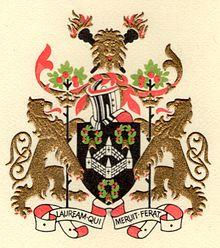The Council for National Academic Awards (CNAA) was the national degree-awarding authority in the United Kingdom from 1965 until its dissolution on 20 April 1993.[1]
The establishment followed the recommendation of the UK government Committee on Higher Education (Robbins Committee), one of whose recommendations being the replacement of the diploma-awarding National Council for Technological Awards with a degree-awarding council. That gave colleges more flexibility, as they could devise their own courses with the oversight of the council, rather than depend on existing universities to accredit courses. In 1974, the National Council for Diplomas in Art and Design was merged into the CNAA.[2]
Qualifications included diplomas, bachelors, masters and doctorate research degrees; by the time of dissolution, it had awarded over 1.3 million degrees and other academic awards.[3] The CNAA awarded academic degrees at polytechnics, central institutions and other non-university institutions such as colleges of higher education until they were awarded university status. When the CNAA was wound up, the British government asked the Open University to continue the work of awarding degrees in non-university institutions. Additionally, the university has responsibility for CNAA records.
The CNAA, through its many subject panels, oversaw the degree-awarding powers of polytechnics. Above all, the CNAA saw itself as preserving a comparability at the national level with degree level awards in universities, a feature which can be seen as having both positive and negative aspects: positive in that it preserved a formal "parity of esteem" between the awards of the two parts of the binary system (such as retaining the common currency of the undergraduate degree for entry to postgraduate study), but other scholars[4] viewed it as negative because it encouraged an "academicism" in the new sector and slowed an acceptance of the transformations required finally to break the boundaries of the old, "elite" system. In the event, the polytechnics were associated with many innovations, including women’s studies, the academic study of communications and media, sandwich degrees, advanced engineering degrees in all functional specialities, and the rise of management and business studies; not least, they were much more responsive than older institutions in providing for the admission of non-standard students from technical colleges, advanced apprenticeships and other sources.
See also
- Business and Technology Education Council
References
- ^ The Education (Dissolution of the Council for National Academic Awards) Order 1993
- ^ Davis, Martin C. (1979). "The council for national academic awards 1964-74: a study of a validating agency" (PDF). Loughborough University.
- ^ World Education News And Reviews, Fall 1992, Vol. 5 / No. 4
- ^ Pratt, 1997.
External links
- Catalogue of the CNAA archives, held at the Modern Records Centre, University of Warwick
- Catalogue of the NCTA archives, held at the Modern Records Centre, University of Warwick
- Open University Validation Services CNAA Aftercare
- The National Archieves Records created or inherited by the Council for National Academic Awards, and related bodies
